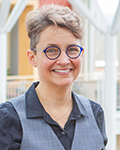2018
Stephanie LeMenager
- Professor
- University of Oregon

Abstract
Through the lens of Oregon’s public lands, this project addresses fundamental questions about the future of US democratic culture: First, is there still such a thing as an “American public,” a national public, and if so how does that public define its common interests? Second, how does attachment to a specific place—through recreational use, hunting/fishing, or agricultural work—shape political and cultural affiliations? Finally, can common places—places managed for use by diverse stakeholders—provoke nonpartisan dialogues, cross-partisan affiliations, and democratic participation regarding questions of resource management? Public lands are sites of rich possibility for democratic participation, despite the fact that they are more endangered than they ever have been. Much of the archive for this project consists of oral histories of Oregonians speaking for themselves about the challenges and pleasures of living and working within the public lands at five distinct regional sites, each representative of a unique ecosystem and environmental history within the American West. Ranchers, farmers, farmworkers, Native American tribes, professional resource managers, and natural scientists are among the diverse voices that inform the project’s narrative about the public lands in Oregon, a state that is well-known for its significant political divisions—often reflecting the stark distinctions between urban and rural US cultures. The results of the interviews and archival research will culminate in a coauthored book, and a digital companion to the book. The project’s field work, book, and digital project are intended to spur conversation among diverse stakeholders about what the future of America’s public lands might be, what kinds of cross-partisan venues devoted to land management decisions have been models of democratic process, and how best to find political and cultural middle ground. Stephanie LeMenager and Marsha Weisiger codirect the Center for Environmental Futures at the University of Oregon. Weisiger is a historian of the American West, with long-term research interests in environmental history, while LeMenager is an environmental humanities scholar and has published widely on environmental media and culture. Award period: September 1, 2018 through August 31, 2020

